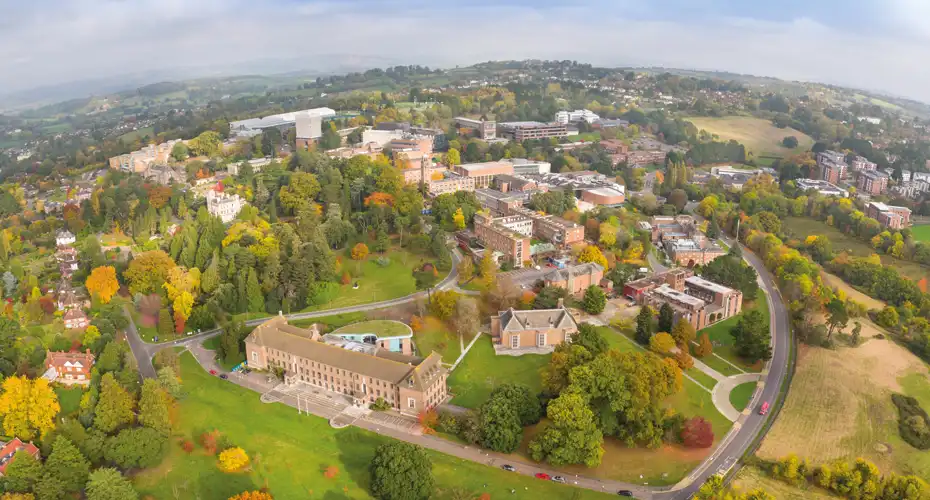Final award:
- IfATE Level 6 Mine Management Degree Apprenticeship
- BEng (Hons) Mining Engineering
- Associateship of the Camborne School of Mines (ACSM)
| Duration | 4 years |
|---|---|
| Entry point(s) | September |
| Application deadline | See How to apply |
| Campus | Penryn Campus, Cornwall |
|---|---|
| Contact | Programme Director: Lewis Meyer |
Overview
- This course has been developed to help upskill those already holding roles within the mining industry, who want to develop their career.
- Apprentices will study a broad range of topics: the underlying maths, digital, geology and physics skills that inform engineering, then mine design, operations, processing, automation, risk, safety, economics, environment and social governance.
- The degree apprenticeship involves innovative learning and teaching methods, achieved through online learning, including recorded lectures, live webinars and residentials.
- Apprentices will study for approximately six hours per week throughout the duration of the course.
- Our flexible learning and online resources minimise disruption so apprentices can continue to fulfil their current roles, whilst earning a Mine Management qualification at the same time.
- Apprentices will develop new knowledge, skills, and ideas that will enable them to become more effective employees who can add real change to their organisations and lay the foundation for a prosperous and challenging career.
- Camborne School of Mines has over 140 years of history and a global reputation for training internationally renowned mining engineers.
![]()
Top 20 in the world for Mineral and Mining Engineering
QS University World Subject Rankings 2025
![]()
2nd in the UK for Mineral and Mining Engineering
QS University World Subject Rankings 2025
![]()
Study at Camborne School of Mines
A world-class combined geoscience and mining department
Entry requirements
| Qualification | Typical offer | Required Subject |
|---|---|---|
| A-Level | ABB | |
| IB | 32/665 | |
| BTEC Extended Diploma | DDM | |
| T-Level | Distinction | |
| Contextual offers | BBC | |
| Equivalences | View other grade equivalences |
NB General Studies is not included in any offer.
Other qualifications of a similar level can be considered. Recognition of prior learning and experience is also available.
Additional requirements
There is a requirement from the Education and Skills Funding Agency that apprentices hold a level 2 qualification in English and Mathematics.
If an applicant does not hold GCSE's (C /4 or above) in English and Maths or cannot evidence these or equivalent qualifications, they should be willing to work towards Level 2 Functional Skills qualifications prior to Gateway.
For more information about how we support Functional Skills, click here.
Applicants must also have a valid and eligible residency status to gain entry onto the apprenticeship – please see the ESFA guidance for further information.
![]()
Top 20 in the world for Mineral and Mining Engineering
QS University World Subject Rankings 2025
![]()
2nd in the UK for Mineral and Mining Engineering
QS University World Subject Rankings 2025
![]()
Study at Camborne School of Mines
A world-class combined geoscience and mining department
How to apply
This programme does not follow the standard UCAS application process. Apprentices will need to already have a position or job offer from a mining company that is willing to support the application. To be eligible for funding, the apprentice must meet the criteria listed in the Education and Skills Funding Agency (ESFA) guidance. Please get in touch with us to proceed with an application or see more information on how to apply.
If a candidate does not meet the funding eligibility criteria for a degree apprenticeship, please see our BEng Mining Engineering part-time programme for the rest of the UK and international students. If you have a query regarding eligibility, please contact Anna Dickinson (Partnership Development Officer) at miningDAPT@exeter.ac.uk.
Funding
Full programme cost: £24,000
The employer fully covers the cost of this apprenticeship; students do not pay for any of the eligible training costs. The students will be an employee of the organisation, gaining a L6 apprenticeship and a University of Exeter award, alongside working and earning a salary.
Employers who pay the Apprenticeship Levy will pay for the apprenticeship fees directly through that contribution.
Employers who do not pay the Levy will be able to claim 95 per cent of the cost of the apprenticeship from the Government. Up to 100 per cent Government contribution may be available if the employer has fewer than 50 employees and:
- Recruits an apprentice aged 16-21
- OR an apprentice aged 22-24 who has previously been in care or who has a local authority education, health and care plan
See further information on the Apprenticeship Levy funding.
Employers must pay their apprentices a salary at least consistent with national legislation.
Funding eligibility criteria
To be eligible for funding the apprentice must meet the criteria listed in the Education and Skills Funding Agency (ESFA) guidance.
The apprentice must have a valid and eligible residency status to gain entry onto the apprenticeship – please see the ESFA guidance for further information.
Course content
As we move towards a world of carbon neutrality there has never been a greater need for the metals that enable renewable energy generation, like copper, lithium, steel and aluminium. That demand translates directly to good jobs for mining engineers.
Our ambition is for our apprentices to graduate, academically ready to grow into senior roles. Apprentices will gain the knowledge and experience to enable them to:
- Understand the mining lifecycle and the investment and fundraising environment
- Design all aspects of mining operations to be safe and productive
- Address the challenges of environmental sustainability, governance and social responsibility
The apprenticeship involves approximately six hours a week of remote learning, up to four weeks of on-site activity per year and the implementation of this knowledge via the practicing of skills and behaviours in the workplace. Apprentices can expect to be stretched and challenged but supported throughout as they develop the academic skills required to rise through the ranks in the mining, tunnelling and allied industries.
The modules we outline here provide examples of what you can expect to learn on this degree course based on recent academic teaching. The precise modules available to you in future years may vary depending on staff availability and research interests, new topics of study, timetabling and student demand.
Your first year includes an introduction the business of mine, the core engineering disciplines of maths, mechanics and fluid mechanics, and engineering thinking, introduced through the Mine Challenge Project.
Compulsory modules
| Code | Module | Credits |
|---|---|---|
| CSM1288DA | Mining Life Cycle and Professional Practice | 30 |
| CSM1289DA | Engineering Fundamentals | 30 |
| CSM1290DA | Mine Challenge Project | 30 |
In second and third year, the focus shifts to mining engineering skills such as geology, rock mechanics, safety, ventilation, and allied skills such as sustainability and mine closure.
Compulsory modules
| Code | Module | Credits |
|---|---|---|
| CSM1291DA | Resource Characterisation | 30 |
| CSM2322DA | Resource Development | 30 |
| CSM2323DA | Energy and Sustainability | 30 |
In final year, strategy subjects are introduced, and the course ends with a group project that demonstrates your competence.
Compulsory modules
| Code | Module | Credits |
|---|---|---|
| CSM3406DA | Economics and Risk Management | 30 |
| CSM3408DA | Feasibility and Business Improvement Project (End Point Assessment) | 30 |
| CSM3404DA | Environmental and Social Governance | 30 |
Learning

On average, approximately six hours per week of a learner’s contractual working time will be given over to directed learning, typically consisting of around six hours per week of remote learning and up to four weeks per year of site visits and residentials on various mines and at CSM.
The first year provides fundamental knowledge underlying mining engineer including mathematics, mechanics and fluid mechanics. The mining business is also introduced, and apprentices undertake a challenge project alone or in small groups at their place of work.
In the second year, further basic skills are acquired, such as electrical engineering, geology and geomatics, and the course starts to move into the core mining subjects such as excavation design, geomechanics and safety and hazard management. The third year continues the pairing of core mining subjects including tunnelling and underground space, and ventilation with important related subjects such as mine closure and risk management.
In final year, the focus moves to tools for strategic thinking: economics, business evaluation, planning, and environmental and social governance, and the year ends with a major project, to put into practice all the skills learnt in the four years of study: Apprentices will complete an individual or group project in the final year; an opportunity to apply knowledge and skills to devise an engineering solution at a professional level. The individual or group project should be done in collaboration with employers, giving the company a tangible benefit.
Residentials will consist of two-week study blocks in Cornwall, and on-site introductions to mining topics at mines across the UK. The extensive opportunities to meet as a group will allow apprentices to share learning from their own experiences and their own mines and to grow their technical peer network.
During and outside of this time apprentices will also be able to meet one-to-one with their academic mentor, as well as participating in progress review meetings with both their academic and work place mentors approximately every six weeks.
Careers
About the apprenticeship
Apprentices will be a full, salaried member of an organisation. Much of the learning will take place at work, either through projects linked to academic content or time set aside for distance learning. Apprentices will be working in an exciting and relevant job from day one of their studies, meaning when they graduate, they'll have both the professional and academic experience sought after by employers.
Employer-valued skills
Solid industry experience is what employers look for when recruiting. The structure of the apprenticeship standards means that apprentices will gain knowledge, skills and behaviours to be a fully-fledged mining engineer at the end of the programme. They will have gained experience in areas including mine design, operations, geotechnical, business, safety, environment, tactical and strategic thinking – all routes to careers within mining and related industries.







